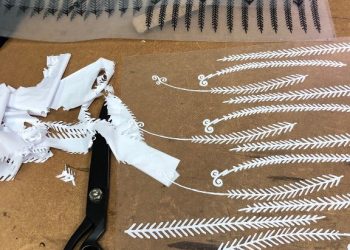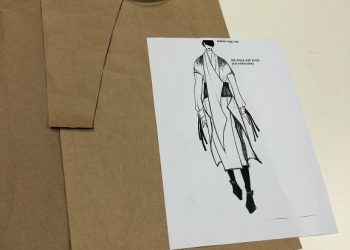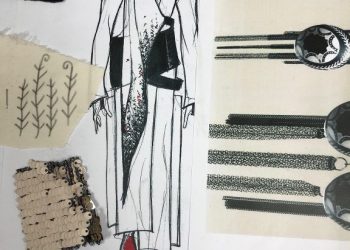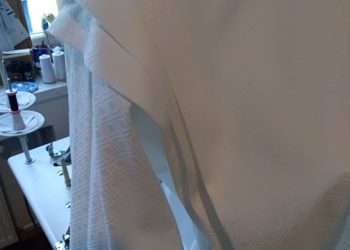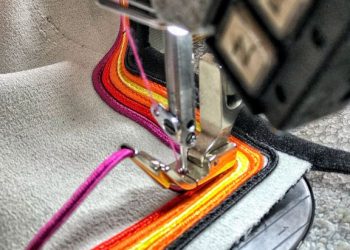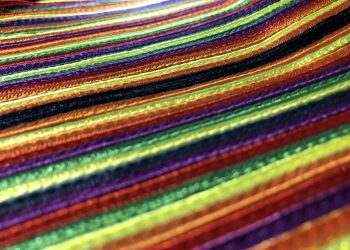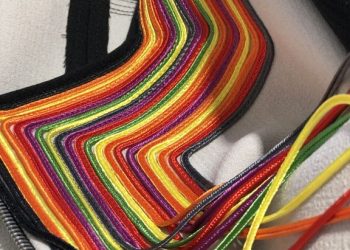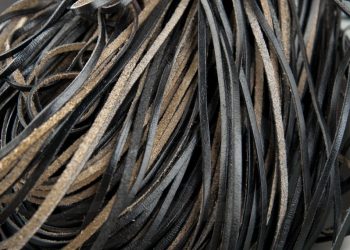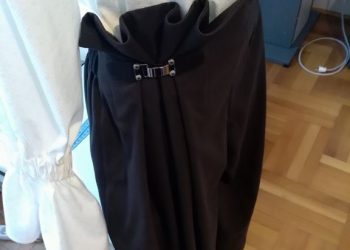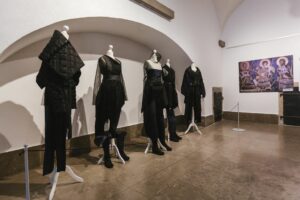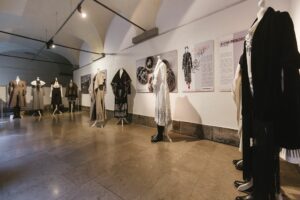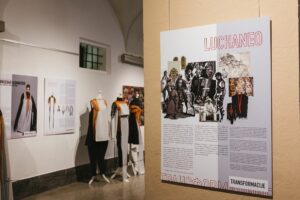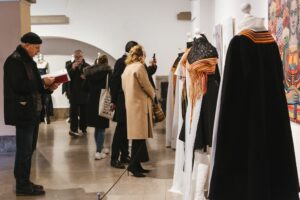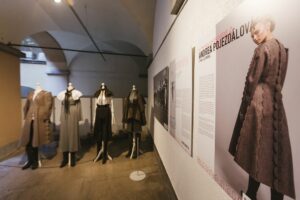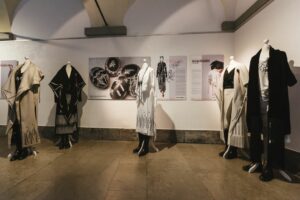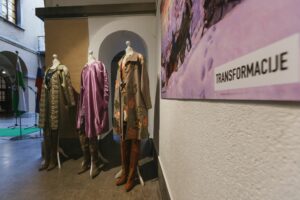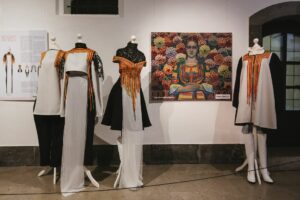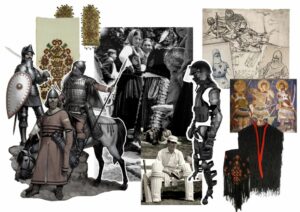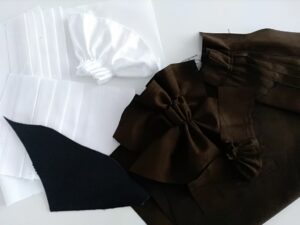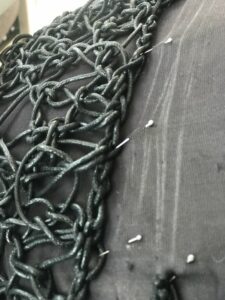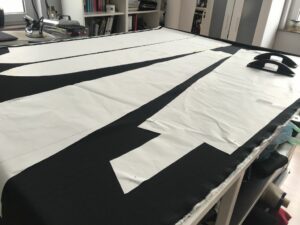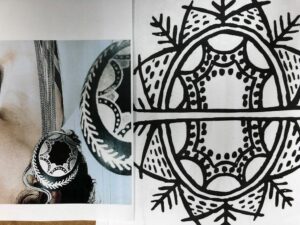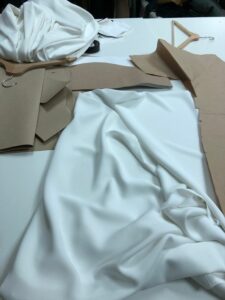Трансформации
ОТ традициите в славянското облекло ДО модерните дизайни
Трансформации на славянското културно наследство в 5 различни модни колекции създадоха:
- Николай Божилов / България,
- Галина и Николай Бирюкови / Руската федерация,
- Невена Иванович / Сърбия,
- Андрея Поездалова / Словакия и
- Йелена Прокович / Словения.
“Дрехите са много повече от това, което се вижда на пръв поглед. Те са израз на индивидуалната идентичност, но същевременно и важен елемент от колективната идентичност и свидетелстват за социалния образ на времето и пространството. В културата на облеклото се отразяват икономическите, обществените, политическите и културните условия, в избраните материали, бродираните мотиви, цветните палитри и кройките са символично превъплътени ценностите, традицията, историческите промени. ”
„SPIRIT“ НИКОЛАЙ БОЖИЛОВ/БЪЛГАРИЯ,
The collection’s primary inspiration is the “nestinarstvo” ritual, a barefoot dance on smouldering embers, protected by UNESCO as Bulgarian intangible cultural heritage. Believed to bring health and fertility the ritual takes place on St. Constantin and St. Helen’s Day on the 3) and 4 June in southeast Bulgaria. After the morning procession with participants carrying icons of both saints the festivities culminate in the evening with the “fire dance”.
Another source of Bozhilov’s inspiration was the characteristic element of the Bulgarian traditional dress, so-called gaytan, decorative braiding “framing” the beauty of Bulgarian women. The interlacing of threads in gaytan is very complex, and may use three to as many as twelve strands of different colours.
Bozhilov based each of his five “looks” on a distinctive item of Bulgarian traditional dress: women’s dress called saya, the traditional women’s litak, traditional men’s trousers potur, and men’s fabrics aba and yamorluk. The pinnacle of the collection is a hand-made gaytan arranged in a colourful composition that frames a woman’s face into exaggeratedly symmetrical proportions. Bozhilov also refined the silhouette, which is more basic and rough in its traditional folk version, so that it shines through the black and white palette in a completely new, elegant dimension. He also added very original, extended collars made of intertwined neoprene threads as the dominant fashion accessory.
The key reference of Spirit’s visual expression is the work of Vladimir Dimitrov – Maistora (1882-1960), one of Bulgaria’s most prominent artists. Maistora was the quintessential Bulgarian painter whose work captures the “Bulgarian spirit”. He dedicated his entire body of work to Bulgaria, its people, in the first place the commoners, its land, history, wars and battles, tradition, folklore, customs, natural beauties and women. Some call his “Bulgarian Madonna”, which depicts a girl from the village of Shishkovtzi, his Mona Lisa.
Spirit is not a collection that simply evokes vernacular mysticism and sublimates the traditional clothing culture. It is much more. It is Nikolay Bozhilov’s unique fashion monument to the painter who was fatally seduced by the fantasy of a perfect woman. The iconic “Bulgarian Madonna” has turned into a true fashion icon.
НИКОЛАЙ БОЖИЛОВ
Nikolay Bozhilov graduated in fashion from the National Academy of Arts in 2011 and completed his Master’s degree there two years later.
In 2010, when still a student, he received the Golden Needle, a prestigious award conferred by the Bulgarian Fashion Academy. In 2011 his collection Morphology won the International Triumph Inspiration Award at London’s Fashion Week. In 2013 he officially launched his own brand and received yet another Golden Needle in Sofia. The next year, he presented his collection Symbiosis at the Mercedes-Benz Fashion Week in Berlin.
Bozhilov works in the creative field of conceptual fashion, intensely focusing on experiments in fashion while trying to create new, timeless aesthetic standards by combining past paradigms with contemporary ones.
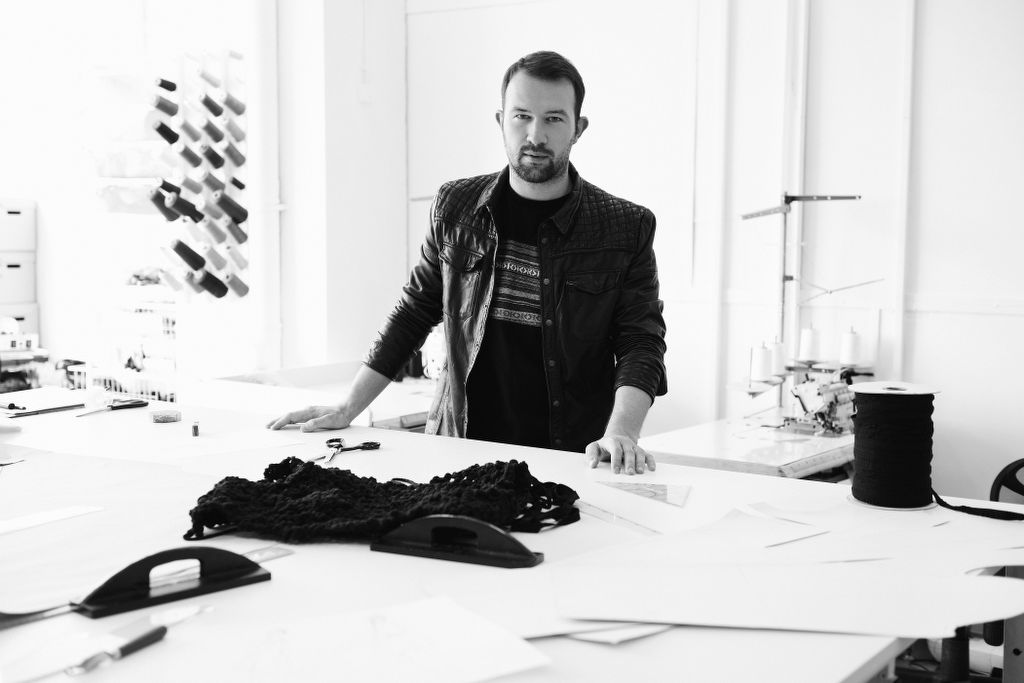
„СРЕБЪРНИЯТ ПРЪСТЕН“ ГАЛИНА И НИКОЛАЙ БИРЮКОВИ / РУСКАТА ФЕДЕРАЦИЯ
Galina and Nikolay Biryukov called their collection the “Silver Ring of Russia”, after the Russian Federation’s new cross-regional initiative that sets out to establish the next grand historic, cultural and tourist route. The first being the famed “Golden Ring of Russia”, of course, spanning more than 700 kilometres of the circular theme route connecting old Russian cities with numerous architectural, religious and cultural sites to the northeast of Moscow.
Similarly, the Silver Ring connects cathedrals, churches, monasteries, palaces, gardens, fortresses and museums gravitating towards the northwest, where the magnificent St. Petersburg dominates over the River Neva and the Baltic Sea.
The Biryukovs use a stylised imperial crown as the leading decorative element of their collection. They had introduced the imperial crown motif, the most exclusive insignia of all Tzar’s regalia, already in their previous collections, e.g. in Top Secret (SS 2018) and Parfum (FW 2018-19), both presented at the Mercedes-Benz Fashion Week Russia. In this context, the Silver Ring takes up the thread of their fashion story.
Another echo or Russian history resonates in the collection’s carefully selected colour scale. It references Galina Biryukova’s roots, as she comes from the region where the iconic painter Dionysius created his famous monumental masterpiece in the early 16th century. The colour palette spanning gold and sky blue to purple and olive green shades deliberately references some of the painters of Russian symbolism.
The couple point out the in*uence of Mikhail Nesterov (1862-1942) and Boris Kustodiev (1878-1927). The latter was nicknamed the “Russian Rubens” for his fondness of depicting full-bodied women. Another source of inspiration for the designers was the work of Isaac Ilyich Levitan (1860-1900), one of the masters of Russian landscape painting.
The Silver Ring collection is a distillate of all of the above – the turbulent history, stunning architecture, breathtaking landscapes, art and religion, nostalgia and melancholy.
ГАЛИНА И НИКОЛАЙ БИРЮКОВИ
Galina Biryukova (1973) graduated from the Moscow Slava Zaitsev Fashion Laboratory led by Vyacheslav Mikhaylovich Zaitsev. In 2016 she received the Lamanova Prize for professional fashion designers. The prize is dedicated to Nadezhda Petrovna Lamanova, fashion and costume designer who had served as supplier of Her Majesty’s Imperial Court before the Russian Revolution and went on to lay the foundations for the new Soviet fashion afterwards.
Nikolay Biryukov is a painter, graphic artist, photographer and fashion designer as well as a graduate of the St. Petersburg School of Restoration, and once even served as a restoration specialist at the Hermitage Museum. In 1995 he graduated from the arts department at the state pedagogical university in St. Petersburg and later taught art history.
Couple Biryukov are the creators of the brand KGB (the initials stand for their names, Kolya Galya Biryukovy) which has so far presented nine collections, namely at the Mercedes-Benz Fashion Week in Moscow, Estet Fashion Week in Moscow, Fashion Week in Minsk, Belarus, and other fashion events. Since 2019, KGB has been the offcial brand of the agency Models Runway Italy from Milan.
Fascinated by the Russian symbolist movement Galina and Nikolay Biryukov with their KGB projects explore the possibilities of siting Russian history of art into a contemporary context.
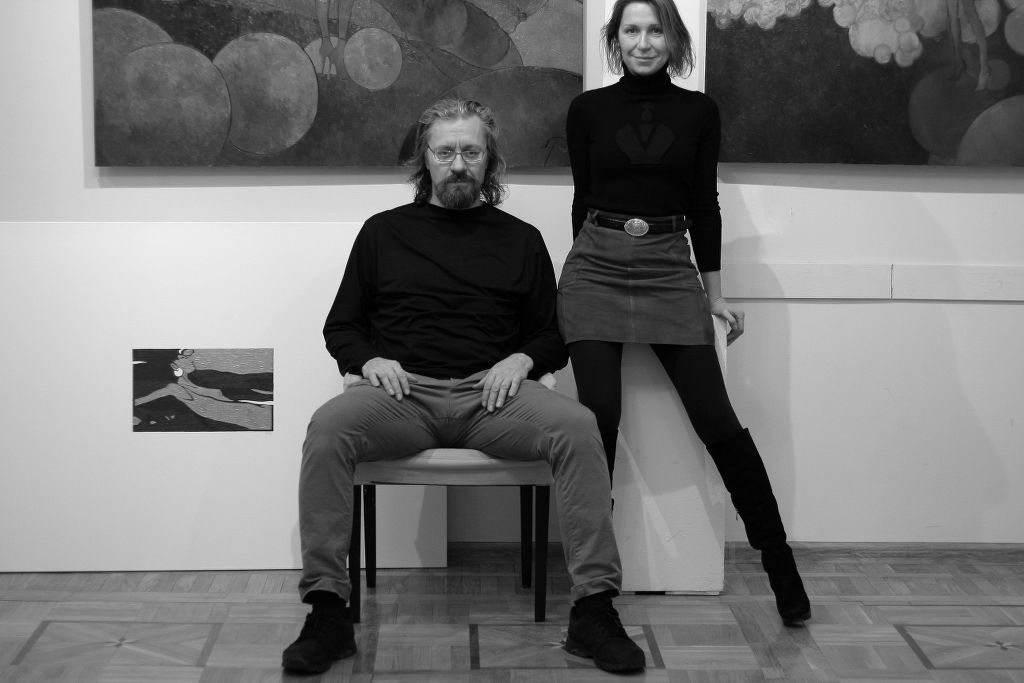
„LUCHANEO“ НЕВЕНА ИВАНОВИЧ / СЪРБИЯ
The Luchaneo collection was inspired by the phenomenon of medieval Serbian knights, who after all the centuries since their demise continue to inform Serbian national identity with their historical and mythic potency. Ivanovic juxtaposed the knights’ armours with modern-day “armours”, uniforms of those believed to be the patrons and protectors of the nation, striking a dialogue between them.
She applied the traditional-contemporary binary to sportswear and equipment as well as uniforms of special police and army forces, which include shields and other gear protecting the body from injury.
Looking back at the formidable knightly silhouette she discretely blended it with elements from Serbian folk costumes that come through in the dark blue jacket, wide waist and a corset, and created a contemporary collection whose narrative speaks to the modern, emancipated woman. The dialogue between history and contemporaneity is further accentuated with innovative use of modern artificial materials: polyester, plastic and synthetic leather. These put an edge on the “soft” side of the collection, which features pieces made of silk, viscose, cotton, wool and other natural materials.
Despotovac in central Serbia is the venue of “Just Out”, the largest medieval festival in Europe, which takes place in the Orthodox monastery Manasija from the early 15th century. This historic, ethnographic, educational, cultural and music festival brings together visitors who come from across Europe and beyond – Russia, Japan and even Iran and Africa – to immerse themselves in the medieval times. Naturally, the festival culminates in the knights’ tournament featuring realistically re-enacted fights between knights competing in various disciplines.
Luchaneo, a collection with exceptionally elaborated construction solutions, demonstrates that creative imagination can blend seemingly incompatible concepts, worlds and epochs. Nevena Ivanović has done it in a truly knightly manner – valiantly, honestly and to the highest creative standards.
НЕВЕНА ИВАНОВИЧ
Nevena Ivanović completed her undergraduate studies at the French school of fashion and fashion management “Mod’Art International”. In 2016 she graduated at the Faculty of Arts and Design in Belgrade. She launched her own brand NEO design.
Her first solo fashion show was in Paris in 2016. In 2017, she won several prizes and awards, and was also selected as the best designer at Serbia Fashion Week. The Fashion Scout SEE prize, which she won the same year, came with a fully sponsored show at London Fashion Week. Later, she recieved a special Belgrade Fashion Week award for promoting Serbian National Heritage. In 2018 and 2019 she dressed the Serbian national representatives for the Eurovision Song Contest.
She is intrigued by Oriental, especially traditional Japanese culture, which inspired her graduation thesis, and also embraces African influences and, naturally, the bountiful heritage of the Balkans.
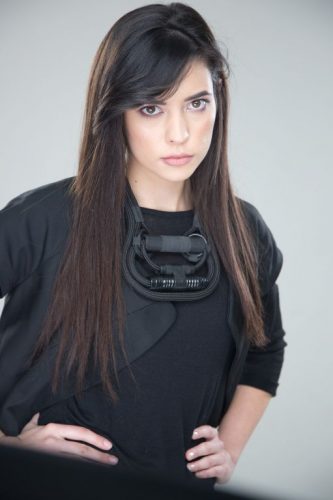
„RETROTOPIA“ АНДРЕЯ ПОЕЗДАЛОВА / СЛОВАКИЯ
Already at first sight, Andrea Pojezdálová’s Retrotopia collection exudes calm spirituality not unlike that which can be seen in Slovak sacred architecture, especially the typical wooden country churches. The author references these architectural gems protected by UNESCO and the traditional Slovak folk costumes as two of the conceptual baselines of her design.
But the collection could not have evolved the way it had if the designer hadn’t tapped into the impressive legacy of one of the most fascinating personalities of Slovak culture. Karol Plicka, Vienna-born Czech photographer, cinematographer, musician and folklorist was a renaissance man through and through. His photographic monograph Slovensko and poetic documentary Zem spieva, the holy grail of Slovak cinematography and ethnology depicting idyllic scenes of “unspoilt” life of organic rural community of the common people whom he follows in the entire “from sowing to the harvest” cycle, were the inexhaustible source for the Retrotopia collection.
With a carefully though-out colour scale Pojezdálová effectively (re)creates the characteristic romantic atmosphere that Plicka so subtly documented in his photographs and films. The garments of Retrotopia come in subdued shades of beige, brown and grey agitated by shiny white and black details. Predominantly natural materials, such as cotton, wool, felt and leather are combined with simple traditional dress-making techniques (folding, hemming, embroidery and decorations) and minimalist design that aptly translates nostalgia into a contemporary clothing paradigm.
Retrotopia is not her first utopia, though. In 2016 Pojezdálová participated in the International Fashion Showcase organised by the British Fashion Council in the framework of the London Fashion Week, marking the 500 years of publication of the most famous of utopias – Thomas More’s.
АНДРЕЯ ПОЕЗДАЛОВА
Andrea Pojezdálová studied fashion design at the Academy of Fine Arts and Design, where she graduated in 2015 with her collection Back to the Roots, which won her the Best Fashion Graduate Award.
Her first breakthrough, however, came with her collection White four years prior and won her the title of Brilliance Fashion Talent for young designer of the year. The same year, in 2011, she won the International Re-act Fashion competition. In 2016 she returned to London with her collection Noir that won her the title Best Designer FL. The same collection was selected also for the international exhibition BIG SEE Fashion Awards 2018 in Ljubljana, Slovenia.
Andrea Pojezdálová uses traditional textile techniques in her designs, employing innovative combinations of materials of di$erent textures, original patterns and restrained, monochromatic colour schemes. In aesthetic terms she describes herself as a “conceptual minimalist” respectful of tradition and committed to the principles of sustainable fashion.
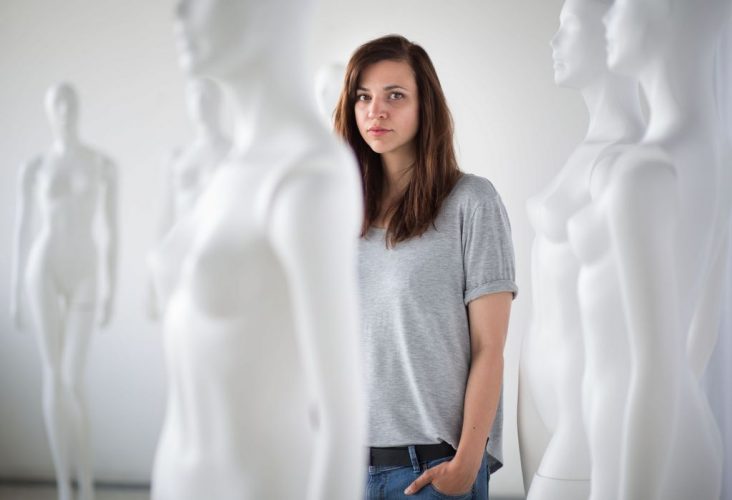
„EGGOMANIA“ ЙЕЛЕНА ПРОКОВИЧ / СЛОВЕНИЯ
Jelena Proković found inspiration for her collection in the age-old traditions of Bela Krajina, a region in the south of Slovenia. It was Bela Krajina folk costume with its clear form, simple ornaments and the dominating white that captivated her imagination. The “leitmotiv” through which she visualised her collection comes from the patterns adorning traditional Easter eggs called pisanice or pisanke, a feature so defining for Bela Krajina that it comes second to none. The Eggomania collection is her personal interpretation of Bela Krajina’s ethnographic heritage through fashion.
The collection comes in black and white with a hint of red, which stands out in embroidery and ornaments, thus consistently adhering to the basic graphic elements that define the folk art and culture of Bela Krajina. At the same time this colour combination, characteristic also for avant-garde painting, distinctly reflects Jelena Proković’s design signature.
Her deconstructionist style draws from modernism and avant-garde, which in her collections frequently evolve into Gothic, futuristic, dystopian and even pseudo-militarist urban aesthetic. The collection is complete with headscarves as arather radical reinterpretation of traditional women’s headdresses characteristic of Bela Krajina, and original jewellery such as necklaces, earrings and fasteners.
Provocatively titled Eggomania, the collection carries two connotations. It can be understood as a result of the author’s fascination with the universal, civilizational, omnipresent symbolism of the egg. But it also references the affirmation of an uncompromising artistic stance and individuality. In another word – ego.
ЙЕЛЕНА ПРОКОВИЧ
Jelena Proković studied at the Faculty of Applied Arts and Design in Belgrade, where she graduated in 2015 in costume design and contemporary clothing culture.
As early as in 1992 she and her sister Svetlana launched their own brand JSP (Jelena & Svetlana Proković) and presented their first collection to the public. With its specific aesthetic and boldness the fashion brand JSP made a key contribution to the formation and development of the visual identity of the urban subculture in the Serbian capital.
The sisters’ collective has received a number of awards, among them BazART for the best fashion show at Belgrade Fashion week 2004, 2007 and 2010. In 2015, Jelena Proković received the Elle Style Award in Ljubljana for the best fashion designer as well as numerous awards for her costume designs, including the most prestigious Slovenian theatre award – Borštnik Award – in 2016. Her body of work spans more than 80 costume designs for theatre and film.
Like the JSP brand, Jelena Proković employs a distinctly avant-garde, modernist and deconstructivist approach to design. Her clothes and costumes are often characterised by aggressive, futuristic, even dystopic and militarist undertones that she offsets with sensuality and femininity.
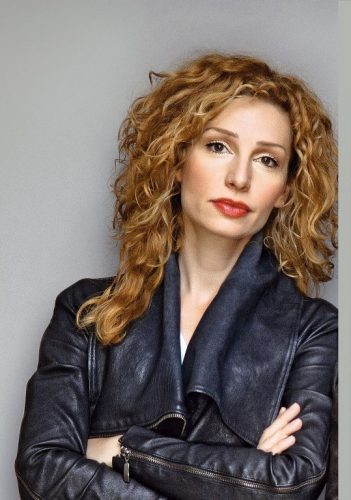
ИЗЛОЖБА
Целта на проекта „Трансформации“ е да пробуди интерес към славянското културно наследство по своеобразен начин и да го доближи до по-широката общественост. Културното наследство на пет славянски страни (Словения, Сърбия, Русия, Словакия и България) оживя на изложбата пред нас. Дрехите и колекциите са вдъхновени от различни истории от културното наследство. Вдъхновението на авторите идва от различни исторически периоди. Колекциите са представени с оригинални облекла, скици от моментите, в които са създадени, както и със снимки от ателиетата.
- Специализиран съветник: Йожица Бродарич
- Моден фотограф: Петър Джодани
- Грим: Ваня Джуран
- Прически: Томаж Турк
АКЦЕНТИРАМЕ
Изложба в Кметството в Любляна
Наградата „BigSEE“ за Божилов
„Трансформации“ – платформа за мода

Новини

Проектът „Трансформации“ продължава
Проектът „Трансформации: ОТ традициите в славянското облекло ДО модерните дизайни“ на Форума на славянските култури (ФСК) е в разгара си. През май 2023 г. бяха заснети колекциите на дизайнери от Полша, Чехия, Хърватия, Северна Македония и Черна гора, а през септември предстои цялостното представяне на проекта в Музея за приложни изкуства в Белград.
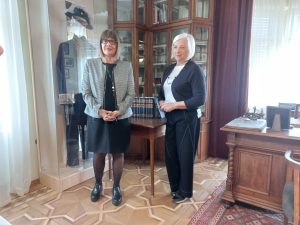
Мая Гойкович, председател на Управителния съвет на ФСК, на работна среща във вила „Златица“
На работна среща, проведена във вила „Златица“, Мая Гойкович, вицепремиер, министър на културата на Република Сърбия и председател на Управителния съвет на ФСК, и Андрея Рихтер, директор на Форума на славянските култури, обсъдиха изпълнението на програмата на ФСК за популяризиране на културата на славянските страни.
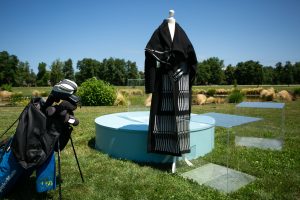
„Eggomania“ на голф игрището в Моравске Топлице
Колекцията „Eggomania“ − дело на словенската модна дизайнерка Йелена Прокович за ФСК, предизвика истински фурор на международния турнир по голф в Моравске Топлице. Словенската модна дизайнерка Йелена Прокович намери вдъхновение в старинните обичаи на словенския регион Бяла Краина за своята колекция „Eggomania“, създадена специално за проекта на ФСК „Трансформации“. Дизайнерката е омагьосана от народната носия,
НАЧАЛО
Проектът „Трансформации“ е първият от редицата дейности, с които Форумът на славянските култури създаде дългосрочна рамкова платформа за модно творчество в славянските страни, което през последните години започна все повече и повече да завладява световните модни сцени със своята специфична чувствителност.
В първата фаза, започнала през 2018 г., проектът обедини избрани модни дизайнери от Словения, Сърбия, Русия, България и Словакия.
Под ръководството на Йожица Бродарич модните дизайнери създадоха специални колекции, вдъхновени от богатото културно наследство на родните си страни, които интерпретираха в глобалния контекст на съвременния моден дизайн с помощта на авторската си визия.

